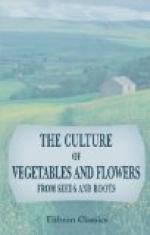Seed sowing should be practised with exceeding caution; but great things may be done where there are warm, sheltered, dry borders, and suitable appliances for screening and forwarding early crops. Under these favourable conditions, we advise the sowing of small breadths of a few choice subjects towards the end of the month; and, this being done, every care should be taken to nurse the seedlings through the trying times that are before them. Such things as tender young Radishes, Onions, small Salads, Spinach, Cabbage, and Carrots never come in too early; the trouble often is that they are seen in the market while as yet they are invisible in the garden. Hedges of Hornbeam, Laurel, or Holly, to break the force of the wind, are valuable for sheltering early borders, and walls are great aids to earliness by the warmth they reflect and the dryness they promote.
The soil for these early crops should be light and rich, and the position extra well drained, to prevent the slightest accumulation of water during heavy rains. Supposing you have such a border, sow upon it, as early as weather will permit, any of the smaller sorts of Cabbage Lettuce, Onion, Long Scarlet Radish, Round Spinach, Cabbage, and Carrot. All these crops may be grown in frames with greater safety, and in many exposed places the warm border is almost an impossibility. Reed hurdles and loose dry litter should be always ready when early cropping is in hand; and old lights, and even old doors, and any and every kind of screen may be made use of at times to protect the early seed-beds from snow, severe frost, and the dry blast of an east wind.
==Forcing== is one of the fine arts in the English garden. It is an art easily acquired up to a certain point, but beyond that point full of difficulty. Every step in this business is a conflict with Nature, and in such a conflict the devices of man must occasionally fail. A golden rule is to be found in the proverb ‘The more haste the less speed.’ Whatever the source of heat, it should be moderate at first, and should be augmented slowly. The earlier the forced articles are required the more careful should be the preparation for them, and the more moderate the temperature in the first instance. There must be at command a constant as well as sufficient temperature: when a forced crop has made some progress a check will be fatal to success. The beginner should acquire experience with Rhubarb and Sea Kale, then with Asparagus and Mushrooms and Dwarf French Beans, and so on to ‘higher heights’ of this branch of practical gardening.
==Artichokes, Globe==, are not quite hardy, and must be protected with litter.
==Asparagus== beds to be heavily manured, if not already done, but the beds need not be dug. Be content to lay the manure on, and the rains will wash the stimulant down to the roots in due time. In gardens near the coast seaweed is the best of manure for Asparagus, and the use of salt can then be dispensed with.




